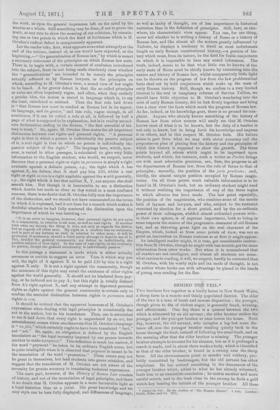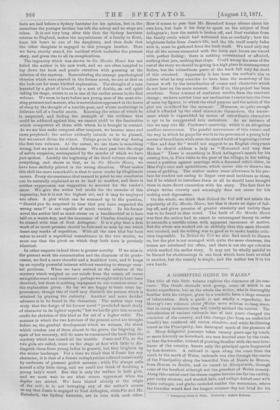BEHIND Tll VEIL.*
Two brothers live together in a lonely house in New South Wales, a sheep farm in a remote and thinly-populated district. The elder of the two is a man of harsh and morose disposition ; the younger, though given to fits of viotent anger, is generally frank, winning, and affectionate. One day there is a quarrel between the two which is witnessed by an old servant ; the elder brother strikes the younger, and the younger brother at once leaves the house. Next. day, however, the old servant, who occupies a log-hut some dis- tance off, sees the younger brother stealing quietly back to the house through the bush, instead of following the usual track, and on the morning after that the elder brother is missing. The younger brother attempts to account for his absence, but as it is prolonged a search is made, and in about three weeks a body, which is identified as that of the elder brother, is found in a swamp near the sheep farm. All the circumstances point to murder and robbery, pro- bably committed by bushrangers, but the old servant has other suspicions. He has noticed something in the demeanour of the younger brother which, added to what he has already witnessed, leads him to an irresistible conclusion ; he makes anotlei fierndaris a id and more
careful search, and in the bush close to the swamp h watch-key bearing the initials of the younger brother. All these
* Behind the Veil. By the Author of "Six Mouths Hence." 3 vols. London: Smith, Elder, and Co. 1871.
facts are laid before a Sydney barrister for his opinion, but in the meantime the younger brother has left the colony and no steps are .taken. It is not very long after this that the Sydney barrister returns to England, makes the acquaintance of a family in Kent, loses his heart to one of the daughters, and then finds that the other daughter is engaged to this younger brother. Here we have, shortly stated, the incident which underlies the present story, and gives rise to all its complications.
The ingenuity which was shown in Six Months Hence has not failed the author in his new work, and we are often tempted to lay down the book and puzzle ourselves with guessing at the solution of the mystery. Remembering the strange psychological theories which were started in the former novel, we are at first on the look-out for some kindred explanation. The thought of a man haunted by a ghost of himself, by a sort of double, an evil spirit taking his shape, occurs to us in one of the earlier scenes in the first volume. We seem to have before us a young man of the most win- ning presence and manner, who is nevertheless oppressed in the hours of sleep by the thought of a terrible past, and whose mutterings in delirium tell of a fearful secret. Knowing the crime of which he is suspected, and feeling the strength of the evidence that could be adduced against him, we cannot yield to the fascination which overpowers all those with whom he is brought in contact. As we see him make conquest after conquest, we become more and more perplexed ; the author evidently intends us to be pleased, but we cannot divine his object. Things go on'in this way during the first two volumes. At the outset, we see there is something wrong, but we are in total darkness. We next pass into the stage of active suspicion, accompanied by the murder of which we have just spoken. Luckily the beginning of the third volume clears up everything, and shows us that, as in Six Months ThlICC, we +have been skilfully piloted in the wrong direction. What makes this skill the more remarkable is that it never works by illegitimate means. Every circumstance that seemed to point to one conclusion c an be naturally explained so as to lead to another, and there is ,neither suppression nor suggestion to account for the reader's error. We give the writer full credit for the exercise of this ingenuity, but it is not the highest art, and it may be employed too often. A plot which can be summed up in the question, " Should you be surprised to hear that you have suspected the wrong man ?" is not capable of much variety. In his former movel the author laid as much stress on a handkerchief as is here laid on a watch-key, and the innocence of Charles Armitage may be classed with that of Noel Arlington. It is a pity that a first work of so mach promise should be followed so soon by one which bears any marks of repetition. With all the care that has been taken to avoid a superficial resemblance in the two stories, we must see that the pivot on which they both turn is precisely identical.
In other respects indeed there is greater novelty. If we miss in the present work the concentration and the clearness of its prede- cessor, we find a more cheerful and a healthier tone, and it keeps tip an equally powerful interest without resorting to strange 'men- tal problems. When we have arrived at the solution of the mystery which weighed on our minds from the outset, all seems straightforward and consistent ; perhaps we ought not to have been .deceived, but there is nothing repugnant to our common-sense in the explanation given. So far we are happy to trace some iin- &movement, though this of itself may diminish the success which is attained by piquing the curiosity. Another and more decided advance is to be found in the characters. The author says very truly that the design of his former novel "precluded much study -of character in its lighter aspects," but we hardly give him so much credit for sketches of this kind as for art of a higher order. The manner in which the two heroines of the present novel are brought before us, the gradual development which we witness, the shock which crushes one of them almost to the grave, the lingering de- spair of her recovery, will do more to recommend the book than the mystery which has caused all the trouble. Jessie and Flo, as the two girls are called, come on the stage at first with little to dis- tinguish them from young ladies in general, but they brighten up the winter landscape. For a time we think that if Jessie has any character, it is that of a female metaphysician relieved occasionally by. outbursts of pleasant girlish sarcasm ; while Flo always calls herself a silly little thing, and we could not think of doubting a young lady's word. But this is only the surface in both girls, and we must wait to see what comes uppermost when the 'depths are stirred. We have hinted already at the origin of the evil ; it is not betraying any of the author's secrets to Bay that Jessie is engaged to Noel Arlington, whileFlo and Mr. Beresford, the Sydney barrister, are in love with each other. How it comes to pass that Mr. Beresford keeps silence about his own love, but feels it his duty to speak on the subject of Noel Arlington's ; how the match is broken off, and Noel vanishes from the family circle which had welcomed him so cordially ; how the brightness fades from Jessie's life, and the life itself nearly fades with it, must be gathered from the book itself. We need only say that all the scenes connected with the loves and lovers are traced with perfect feeling ; there is nothing overstrained or affected, nothing that jars, nothing that cloys. Could we say the same of the rest of the story we should be giving it a high place in contemporary fiction, but the subordinate parts of the book fall very far short of this standard. Apparently it has been the author's aim to relieve what he may consider to have been the monotony of his former work by the introduction of scenes and characters which do not bear on the main interest. But if so, this project has been overdone. Some amount of confusion results from the constant change ; we have neither time nor inclination to enter into the lives of mere lay figures, to which the chief persons and the action of the plot are sacrificed for the moment. Moreover, as quite enough relief is afforded by the chief characters themselves, the amuse- ment which is superadded by means of subordinate chara,7ters is apt to be exaggerated into caricature. As an instance of this we may cite Mr. PinthornS courtship, which is an altogether needless excrescence. The painful nervousness of this curate and the way in which he gasps for words in the presence of a young lady savour of broad farce,while even the absurd habit of beginning a letter "Rev, and dear Sir" would not suggest to an English clergyman that he should address a lady as "Honoured and very dear Madam." There is something in Noel Arlington's search for his missing box, in Flo's visits to the poor of the village, in her taking round a petition against marriage with a deceased wife's sister, in Miss Fry's cant and spitefulness, which seems also to deserve the name of padding. The author makes some allowance in his pre- face for readers not caring to linger over such incidents as these, but if he wished to introduce them at all he should have brought them in more direct connection with his story. The fact that he always writes cleverly and amusingly does not atone for his making such digressions.
On the whole, we think that Behind the Veil will not attain the popularity of Six Mi»dhs Hence, but that it shows no signs of fall- ing off, and gives promise of greater elasticity and variety than was to be found in that novel. The fault of Six Months Bence was that the author had to resort to extravagant theory in order to reconcile a terrible crime with apparent innocence of motive. But the whole was worked out so skilfully that this main blemish was excused, and the writing was so good as to make hostile criti- cism impossible. In Behind the Veil we also find much to disarm us, but the plot is not managed with quite the same clearness, the scenes are interlaced too often, and there is not the apt cohesion which marked the earlier story. It may not be wholly painful to be blamed for shortcomings in one book which have been avoided in another, but the remedy is simple, and the author has it in his own hands.































 Previous page
Previous page